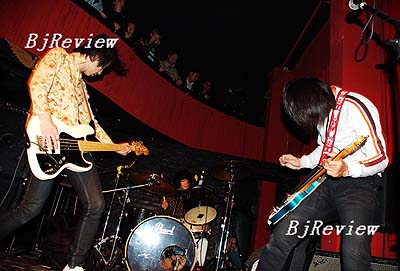|

Zhao Zijian leads a double life. He holds down a 9-to-5 job as a computer programmer during the day and gets rid of his frustration and stress with his mates after hours in a rock band. They're called Hedgehog and their music is as spiky as the little creature they're named after.
"It's tiring, but it is nothing compared with the enjoyment we get from the music," said Zhao, who handles lead guitar and has been playing the Beijing club circuit since 2005, building up a large following.
Jiao Chuanbo, a bassist for hard rock outfit Slow Me, mirrors Zhao's lifestyle. He is an architect and spends most of his spare time practicing bass. In fact most of the capital's rock musicians manage their time in this way.
It's a big leap from rock musicians of the 90s, who were quite cynical and angry about society and life. "We never think of ourselves as different from others and don't boast about being members of a band," Zhao said.
He explained that the musicians go to work, play by interpersonal rules, don't wear outrageous clothing and in no way look different to anyone else. "These are the characteristics of rock players of a new generation. Most of our music is focused on cultural communication," Zhao added.
Apart from Hedgehog, there are a wide variety of rock bands in China, most of whom gather in Beijing, the Mecca of the Chinese rock world. "Beijing is paradise for rock musicians and fans," said Liu Lixin, a guitarist with metal rockers Ordnance.
Liu is from Inner Mongolia and came to Beijing more than 10 years ago with a passion for rock music. Now, he manages 13club, a bar located in the predominantly student area of Wudaokou, west Beijing, one of the city's premier rock venues. Ordnance has carved out a big support base.
"I get up at 3 p.m. everyday, and spend almost the whole day and night in my bar, sleeping at 3 a.m.," said Liu, who admits to enjoying his lifestyle. According to him, once all the members had saved up enough money, they would chuck in their day jobs and play full time.
Note by note
Compared to the West, the idea of rock music is relatively new in China. The first electric guitar was only introduced in the 1980s, so when China had first began to experience rock music, it already had a 30-year history in the United States preceded by strong musical traditions in gospel, blues, country and folk.
Most rock aficionados in China agree that the person most credited with breaking down the barriers around rock music is Cui Jian. Known to all as Lao Cui, he is recognized as the father of rock & roll in China and often is compared to Elvis Presley, Bob Dylan and Bruce Springstein by the Western media.
Many still talk about his seminal performance in May 1986 at a Beijing concert commemorating the Year of World Peace. Cui belted out the song Nothing to My Name, which left an audience dumbstruck and in awe, and in the process earned him a legion of rock fans from that moment that continue to sing his praises to this day.
Cui released the album Rock ‘N' Roll on the New Long March in late 1986, featuring Nothing to My Name that went on to become China's biggest selling album ever. But his originality is not often the case in the Chinese rock scene.
Will Jameson, a foreign exchange student at Peking University and guitarist with the band Lecher, which he formed with a drummer from the United States and a bassist from China, said too many local bands are carbon copies of each other and are still too influenced by American music.
| 